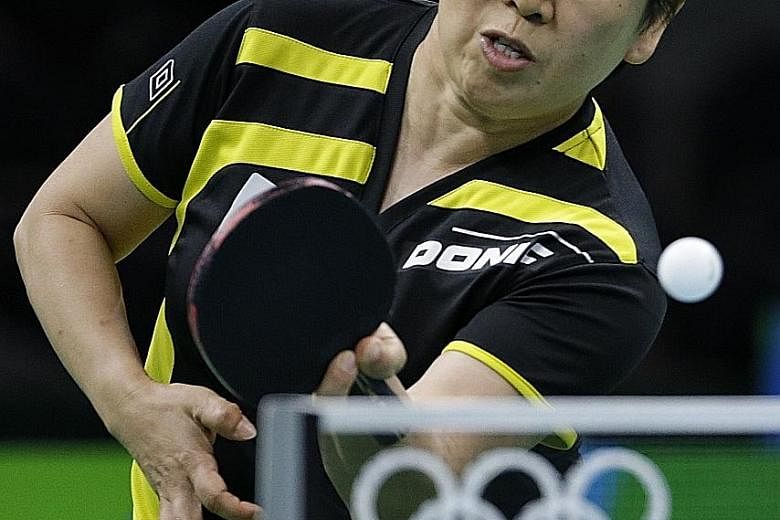RIO DE JANEIRO • Many Olympic sports feature athletes born outside of the country they represent.
Table tennis, however, is an outlier: About a third of its participants this summer were born outside the nation they are representing. All other sports are far behind. And most of the players come from one nation: China.
In Rio, China-born table tennis players represented China as well as 21 other countries, including Singapore. Of the 172 competing paddlers, 46 (28 women, 18 men) were born in China.
Considered together, the list of China-born paddlers highlights the huge scope of China's influence in the sport and illustrates perhaps its most pressing question: Is this the best way for table tennis to grow?
"It's not a problem," Thomas Weikert, the president of the International Table Tennis Federation (ITTF), the sport's governing body, said last week. "It's an issue."
At these Olympics, it has been business as usual, as China swept all four golds at stake - in the men's and women's singles and team competitions. It has won 27 of the 31 golds awarded in all competitions since table tennis was added to the Olympics in 1988.
One by-product of China's dominance - and the popularity of the sport in the country - has been an extremely large group of talented players who are not quite good enough to play in the national programme in which only the top 100 (50 men, 50 women) are chosen.
-
31%
Table tennis players who represent a country he or she was not born in - the highest among all sports, followed by basketball (15%) and equestrian (13%). For athletics and swimming, the two ever-present and most popular sports, it is 9%.
-
5%
Percentage of China-born players (two from Germany out of 40), who won a table tennis medal in Rio. China's six players swept all four golds on offer.
"There was too much competition," said Luxembourg's Ni Xialian, 53, who left the national team in 1986 to attend college, before joining a professional club in Germany in 1989. "I didn't have the courage anymore."
Such decisions became widely possible after economic reforms in China in 1978 loosened the rules for overseas movement and work.
Players facing dim prospects in China have increasingly sought to extend their careers as both players and coaches, in other countries eager to host them.
"After I lost my opportunity to get into the Chinese national team, I was still young, I still had my dream," said Eugene Wang, 30, who was offered a spot on the Canadian team shortly before the 2012 Games. "At the same time, I had this invitation. I just went for it."
Marcos Madrid, a player from Mexico, sighed and smiled when asked how players felt about the spread of Chinese players worldwide. "It's complicated," he said, echoing the sentiments of many players in the game.
Everyone acknowledges how far ahead China remains in terms of training and skill. The thinking for many national federations has been that having such skilled players and coaches around - beyond giving them a chance to win competitions in the short term - will raise the skill levels of their other players.
However, in most parts of the world, there are simply not enough good players to measure oneself against. Chinese players often double as coaches and sparring partners for players in their adopted countries.
At the same time, many players become irked when the spirit of competition seems to be undermined.
Players notice when recently transferred athletes appear interested only in furthering their own careers, or fail to exceed some ambiguous threshold of enthusiasm about their new homes, or spend most of their time in their home countries.
Such judgments - if they have a purpose - seem hard to make. Circumstances vary hugely from player to player, with only talent as a common factor.
In the end, it is hard for anyone to articulate which players are considered to have switched national allegiances the "right way".
That may explain why Weikert said he would like to do more to change the global imbalance in skill.
He revealed that the ITTF had begun work in recent months on a project through which young, non-Chinese players could live and train in China's training sites for years at a time, learning and improving in that highly competitive ecosystem.
"It's difficult for a sport if only one nation is winning," Weikert said.
"But this is not the fault of the Chinese. The others have to practise hard."
NEW YORK TIMES

